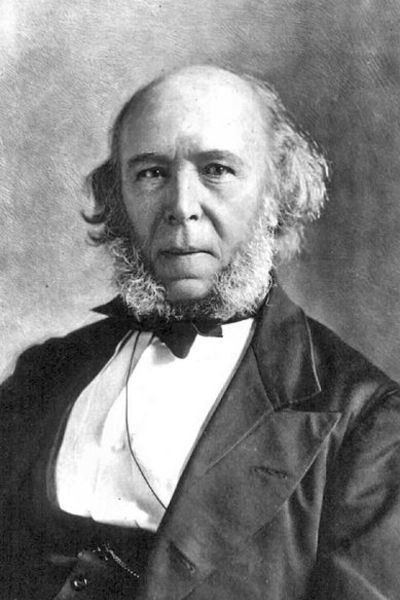Liberty Matters
Some Implications of Spencer’s Relative Ethics
 In my lead essay I called attention to my dissatisfaction with Spencer’s distinction between absolute and relative ethics. In this comment I shall mention some of the unsavory implications (from a libertarian perspective) of that distinction.
In my lead essay I called attention to my dissatisfaction with Spencer’s distinction between absolute and relative ethics. In this comment I shall mention some of the unsavory implications (from a libertarian perspective) of that distinction.Throughout The Principles of Ethics we find statements like the following: “[S]ocial self-preservation takes precedence of individual self-preservation”; “the needs for social self-preservation must override the claims of individuals”; “the preservation of the species, or that variety of it constituting a society, is an end which must take precedence of the preservation of the individual.”[147]
The priority given by Spencer to society over the individual in these passages may seem flatly to contradict his other statements that society exists for the benefit of individuals, not vice versa, but Spencer would concede no such inconsistency. The absolute sovereignty of the individual, he argued, is a principle of absolute ethics that applies only to the perfect society—a consistent “society of contract” in a condition of complete peace, a society in which no remnants of the militant system remain. During transition periods, however, when the threat of war renders national self-defense necessary, we must follow the dictates of relative ethics, which tell us that the individual and his property may—indeed, must—be sacrificed for the good of society. Thus “the right to individual liberty like the right to individual life, must be asserted subject to qualifications entailed by the measures needful for national safety.”[148] Spencer, in this defense of military conscription, continued:
Such trespass on liberty as is required to preserve liberty, has a quasi-ethical warrant. Subject only to the condition that all capable members of the community shall be equally liable to it, that restraint on the rights of free motion and locomotion necessitated by military organization and discipline, is legitimate, provided always that the end in view is defensive war and not offensive war.[149]
This was not the only place in The Principles of Ethics in which Spencer defended conscription. Here is another instance.
It remains only to say that while, in a system of absolute ethics, the corollary here drawn from the formula of justice [the Law of Equal Freedom] is unqualified, in a system of relative ethics it has to be qualified by the necessities of social self-preservation. Although we have seen that the primary law that each individual shall receive and suffer the benefits and evils of his own nature, following from conduct carried on with due regard to socially-imposed limits, must, where the group is endangered by external enemies, be modified by the secondary law, which requires that there shall be such sacrifice of individuals as is required to preserve, for the aggregate of individuals, the ability thus to act and to receive the results of actions. Hence, for the purposes of defensive war, there is justified such contingent loss of physical integrity as effectual defence of the society requires: supposing always that effectual defence is possible. For it would seem to be an implication that where the invading force is overwhelming, such sacrifice of individuals is not justified.[150]
Spencer used the same reasoning to justify not only conscription but also taxation and confiscation by the state of a certain percentage of inherited property.[151] He even went so far as to defend the suppression of free speech, if “the beliefs openly entertained are such as tend directly to diminish the power of the society to defend itself against hostile societies.”[152]
Spencer summarized the upshot of his dichotomy between absolute and relative ethics as follows: “Only, indeed, as we pass gradually from that system of statuswhich chronic hostilities produce, to that system of contract which replaces it as fast as industrial life becomes predominant, does the assertion of rights in general become more and more practicable and appropriate….”
It is not my purpose to criticize Spencer’s perverse notion of relative ethics. Suffice it to say (to paraphrase Antony Flew) that under Spencer’s system of relative ethics individual freedom dies the death of a thousand qualifications.
Endnotes
[147.] The Principles of Ethics (New York: D. Appleton and Company, 1898), II:125, 139, 79. Cf. ibid., 71, 101.
[148.] Ibid., II:79.
[149.] Ibid.
[150.] Ibid., II:71.
[151.] Ibid., II:125-26
[152.] Ibid., II:139.
Copyright and Fair Use Statement
“Liberty Matters” is the copyright of Liberty Fund, Inc. This material is put on line to further the educational goals of Liberty Fund, Inc. These essays and responses may be quoted and otherwise used under “fair use” provisions for educational and academic purposes. To reprint these essays in course booklets requires the prior permission of Liberty Fund, Inc. Please contact oll@libertyfund.org if you have any questions.